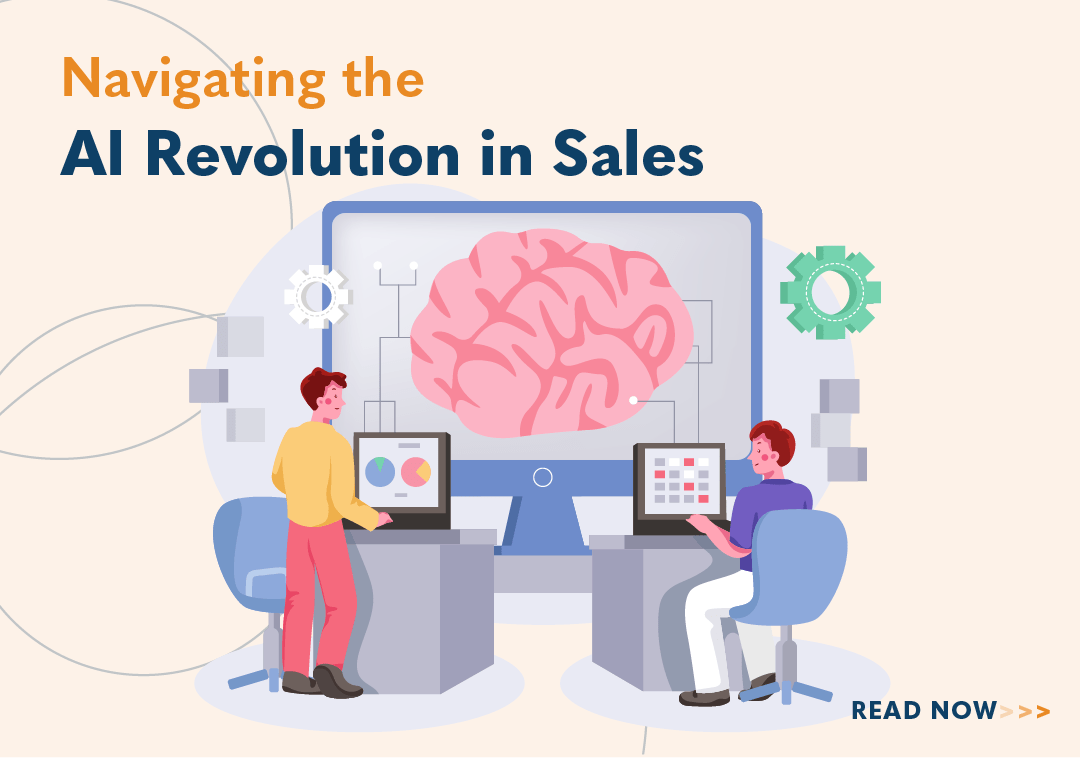Navigating the AI Revolution in Sales

Will Artificial Intelligence replace B-to-B salespeople? I believe the answer is, No. I believe salespeople are irreplaceable when it comes to B-to-B complex sales. But an alternative question sales leaders must consider is, “Do salespeople need to be trained in AI?” An uncontroversial hypothesis is that salespeople who understand Artificial Intelligence will outperform those who don’t. In this article, we explore the impact of AI on sales, considering the pros and cons while navigating how sales leaders can successfully leverage this technology to enhance their sales teams’ performance.
AI is fundamentally changing the way we all work in sales. Specifically, natural language processing (NLP) offers numerous benefits for salespeople, transforming how we engage with customers and manage the sales processes. NLP’s fundamental strength as a new technology is that it allows salespeople to talk to computers in their everyday voice without learning programming or coding.
Technology Learning Curve
Every emerging technology comes with a learning curve. Salespeople who embrace this new technology and adapt to the evolving work methods will undoubtedly gain a significant advantage over their peers who are slower to adopt. However, it’s important to remember that, like with any new tool, there’s also the potential for it to be used improperly or inappropriately.
Consider email—an invaluable tool for salespeople—but it also gave rise to spammers, spam filters, and junk boxes. The overuse of the telephone led to the necessity of ‘Do Not Call’ lists. Similarly, by over-relying on ChatGPT for all customer interactions, the salesperson neglects genuine human engagement and personalization, potentially leading to a decline in trust and rapport with prospects.
Consider the scenario on LinkedIn where sales professionals employ AI to dispatch outbound messages. If you’ve been on the receiving end of one, you’re likely familiar with the lack of personalization in these so-called “personalized” messages. This approach typically involves compiling a list of target accounts based on keywords in profiles or job titles, followed by sending a one-size-fits-all message to everyone on that list. Unfortunately, this tactic often yields the opposite of the intended effect, leaving recipients disconnected rather than engaged.
Effectiveness Over Efficiencies
“There is nothing quite so useless as doing with great efficiency something that should not be done at all” is a quote from Peter Drucker. It’s a reminder that new sales technology should be applied judiciously with careful consideration of the strategic vision.
In selling, effectiveness should take precedence over efficiency. Effectiveness in sales is about achieving the desired outcomes. Efficiency is about achieving results with minimum resources.
Finding the proper relationship between efficiency and effectiveness is critical to optimizing sales performance.
Solving Problems
In a 2022 Gartner survey, it was found that almost 90 percent of sales professionals are experiencing burnout. Even more concerning, over half of them are actively seeking new career opportunities.
Enter AI to the rescue. It addresses a significant pain point for salespeople and sales leaders: keeping CRM data up-to-date. It can seamlessly handle this task, updating the CRM after each sales call with summary descriptions and even crafting post-sales call emails. Picture the time saved, and potential errors avoided!
Anyone who’s spent more than a day in sales leadership understands the absolute necessity of having accurate, current data in the CRM. It’s the lifeblood of informed decision-making, targeted marketing, and effective follow-ups. With AI managing this critical aspect, the sales team can redirect their focus toward what truly counts—cultivating relationships and sealing deals. The impact on productivity and job satisfaction can be nothing short of transformative.
Fundamental Flaw
As B2B sales professionals, we understand that staying ahead of the curve is essential. That’s why it’s critical to address the fundamental flaws of current AI tools like ChatGPT. The current cutoff date for GPT-3.5 (the free version of ChatGPT) is September 2021, and it struggles with accuracy beyond that point. To truly unlock sales productivity, real-time business data is required.
Building Trust: The Cornerstone of Effective Selling
In the complex world of B2B sales, trust reigns supreme. Buyers often grapple with uncertainty about their needs, relying heavily on accurate, up-to-date information from sales reps. The urgency of ensuring our data is current cannot be overstated here.
Order-Takers vs. Order-Makers: Navigating Customer Ambiguity
Customers don’t always have a clear vision of what they need. This is where the distinction between order-takers and order-makers becomes vital. By possessing the most recent and relevant data, we empower ourselves to guide our clients toward the solutions that best align with their goals.
Outbound Sales: Bridging the Trust Gap
Outbound sales, though essential, can be fraught with challenges and skepticism. It often operates from the standpoint of initial mistrust. Our ability to quell this skepticism lies in presenting accurate, real-time information relevant to the buyer, which establishes us as trusted advisors rather than mere sellers.
The Pitfall of Cost-Efficiency in Email Outreach
While AI undeniably revolutionizes outreach by minimizing the cost of personalized emails, we must be cautious of potential downsides. Over-reliance on this approach can lead to buyer fatigue and a decline in crucial metrics, such as connections made and meetings booked. SDR teams may need to reassess their strategies or transition into full-cycle roles to adapt effectively.
Conclusion
In the ever-evolving landscape of sales, one truth remains unshakeable: the effectiveness of modern sellers hinges on their ability to establish trust. Unfortunately, many sales professionals fall into the trap of misusing technology to build trust. They send boilerplate messages about generic benefits, hoping to create interest. To stand out, we must challenge ourselves to be dynamic, innovative, and captivating in our approach to clients.
In looking ahead, it’s crucial to realize that AI isn’t just an amplifier of past sales practices. New technology means new strategies. Future sales professionals must move beyond the strategies that defined SDRs and Account Executives in 2020. The focal point is being a skilled problem-solver, moving past the traditional role of pushing products. This transformation is at the core of leveraging AI effectively in sales roles. In this age of abundant sales technology, it is easy for sales tools to blur together. Training and education take center stage, ensuring sales teams fully grasp the potential of new technologies. The marriage of AI and sales is not a distant vision. It’s a present reality. For sales leaders the question is: Are you ready to shape the future of sales, or will you be shaped by it?

- Account Planning (11)
- Awards (49)
- Client Testimonial (37)
- Personal Branding (19)
- Podcast (11)
- Research (70)
- Sales Career Development (87)
- Sales Coaching (156)
- Sales Consulting (137)
- Sales Culture (170)
- Sales Enablement (354)
- Sales Leadership (109)
- Sales Management (248)
- Sales Negotiation (16)
- Sales Prospecting (125)
- Sales Role-Playing (18)
- Sales Training (235)
- Selling Strategies (263)
- Soft Skills (70)
- Talent Management (94)
- Trusted Advisor (27)
- Virtual Selling (49)
- Webinar (9)


























